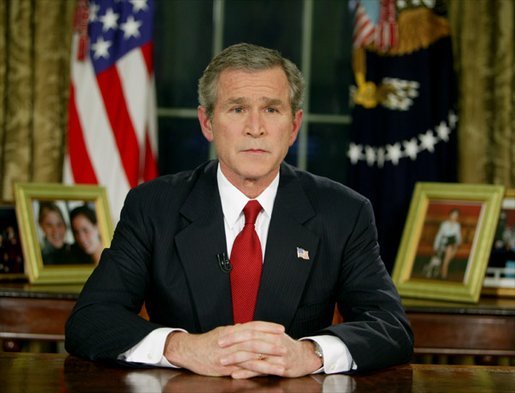
In the US foreign policy community, one major legacy of George W. Bush’s war in Iraq is that it gave Iraq to the Shiites and thus to Iran. There is some focus on the fact that the administration lied the country into war, and almost none on the fact that this led to hundreds of thousands of deaths and unimaginable suffering for millions of Iraqis. Among the “foreign policy community,” the geo-political legacy is that the war was a gift to Iran, which no longer faces a neighboring nemesis and is exponentially better positioned for the regional dominance it seeks.
That is true, and it was a massive strategic blunder for policymakers in Washington aiming to maintain regional hegemony over the Middle East. But a better illustration of the war’s legacy is what is going on in Syria right now: al-Qaeda jihadists, bred in the wake of the American invasion and who flooded to Iraq to fight the Crusaders, are now an actual entity that has flooded over the border into Syria to fight the next holy war. The fact that the Syrian rebels are largely made up of extremists is one of the major factors persuading Washington not to intervene militarily.
Al-Qaeda in Syria (formerly al-Qaeda in Iraq) is preventing what would probably be a par for the course humanitarian intervention against the Assad regime and making the prospect of terrorist rebels sacking Damascus and rising to political power a dangerous reality. That should be considered by the elite foreign policy community to be at least as big a geo-strategic loss as Iran’s new regional stature.
The huge spectacle and sheer enormity of the terror of 9/11 has helped reinforce an illusion about al-Qaeda at that time. Despite what the greatest terrorist attack on US soil in American history would seem to indicate, they were a small group, marginalized everywhere they went. They were a small group of extremists peculiarly obsessed with US military troops in Saudi Arabia. They used Israel-Palestine, resentment towards US-supported dictators and the sanctions-enabled genocide in Iraq to excite the Muslim masses to their cause, but nobody rose up like they’d hoped.
And then Iraq happened. The 2006 National Intelligence Estimate on Trends in Global Terrorism said that the Iraq war was “breeding deep resentment of US involvement in the Muslim world and cultivating supporters for the global jihadist movement.” The former head of the CIA’s Counterterrorism Center Robert Grenier said the war “has convinced many Muslims that the United States is the enemy of Islam and is attacking Muslims, and they have become jihadists as a result of their experience in Iraq.”
Bush’s maniacal foreign policy gave global appeal to al-Qaeda’s militant anti-US brand. And now the US is faced with several independent off-shoots that draw inspiration from the comparatively small original clan. There is al-Qaeda in the Islamic Maghreb, many of whose members fought the rebel war in Libya and were themselves veteran jihadis in Iraq. Groups in Syria like Jabhat al-Nusra, which the US State Department last month officially designated a Global Terrorist organization, identifying the group as an offshoot of al-Qaeda in Iraq. And al-Qaeda in the Arabian Peninsula, which according to Washington has coordinated at least a few attempted attacks on the US.
Now, President Obama’s so-called “counter-terrorism” policies have been equally counterproductive. His surge in Afghanistan, his relentless secret drone war in Pakistan and Yemen, his shortsighted intervention in Libya, and his limited backing of Syrian rebels have all contributed to the bolstering of al-Qaead groups.
But there is not enough emphasis on Bush’s contributions here, specifically the extent to which the Iraq war contributed. That legacy is not just the strategic blunder of an unnecessary war that failed to yield sufficient geo-political gains. It is one of creating an entirely new and larger generation of al-Qaeda terrorists.


